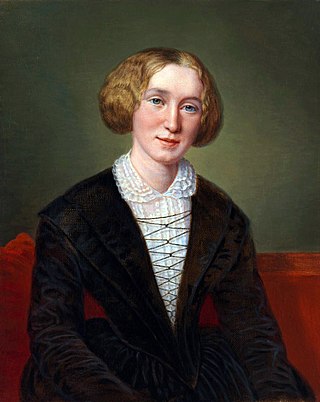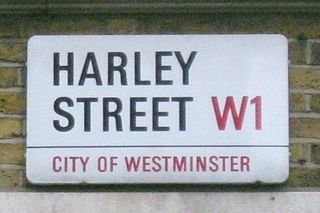Related Research Articles

Mary Ann Evans, known by her pen name George Eliot, was an English novelist, poet, journalist, translator, and one of the leading writers of the Victorian era. She wrote seven novels: Adam Bede (1859), The Mill on the Floss (1860), Silas Marner (1861), Romola (1862–63), Felix Holt, the Radical (1866), Middlemarch (1871–72) and Daniel Deronda (1876). Like Charles Dickens and Thomas Hardy, she emerged from provincial England; most of her works are set there. Her works are known for their realism, psychological insight, sense of place and detailed depiction of the countryside.

William Wilkie Collins was an English novelist and playwright known especially for The Woman in White (1859), a mystery novel and early "sensation novel", and for The Moonstone (1868), which established many of the ground rules of the modern detective novel and is also perhaps the earliest clear example of the police procedural genre.

Household Words was an English weekly magazine edited by Charles Dickens in the 1850s. It took its name from the line in Shakespeare's Henry V: "Familiar in his mouth as household words."

William Charles Macready was an English stage actor.

Harley Street is a street in Marylebone, Central London, named after Edward Harley, 2nd Earl of Oxford and Earl Mortimer. Since the 19th century it has housed a large number of private specialists in medicine and surgery.

Francis William Newman was an English classical scholar and moral philosopher, prolific miscellaneous writer and activist for vegetarianism and other causes.

The Cornhill Magazine (1860–1975) was a monthly Victorian magazine and literary journal named after the street address of the founding publisher Smith, Elder & Co. at 65 Cornhill in London. In the 1860s, under the editorship of William Makepeace Thackeray, the paper's large circulation peaked around 110,000. Due to emerging competitors, circulation fell to 20,000 by 1870. The following year, Leslie Stephen took over as editor. When Stephen left in 1882, circulation had further fallen to 12,000. The Cornhill was purchased by John Murray in 1912, and continued to publish issues until 1975.

The Northern Star and Leeds General Advertiser was a chartist newspaper published in Britain between 1837 and 1852, and best known for advancing the reform issues articulated by proprietor Feargus O'Connor.

The Olympic Theatre, sometimes known as the Royal Olympic Theatre, was a 19th-century London theatre, opened in 1806 and located at the junction of Drury Lane, Wych Street and Newcastle Street. The theatre specialised in comedies throughout much of its existence. Along with three other Victorian theatres, the Olympic was eventually demolished in 1904 to make way for the development of the Aldwych. Newcastle and Wych streets also vanished.
The bibliography of Charles Dickens (1812–1870) includes more than a dozen major novels, many short stories, several plays, several non-fiction books, and individual essays and articles. Dickens's novels were serialized initially in weekly or monthly magazines, then reprinted in standard book formats.

The Tremont Temple on 88 Tremont Street is a Baptist church in Boston, affiliated with the American Baptist Churches, USA. The existing multi-storey, Renaissance Revival structure was designed by architect Clarence Blackall of Boston, and opened in May 1896. It replaced a much smaller, 1827 structure that had repeatedly suffered damage by fires.

Brooks's is a gentlemen's club in St James's Street, London. It is one of the oldest and most exclusive gentlemen's clubs in the world.
Edmund Roberts Larken (1809–1895) was an English cleric and Christian socialist, a patron of radical causes and author on social matters. Along with other unconventional views, he was noted as possibly the first parish priest of his time to wear a beard.

Elizabeth "Eliza" Ann Ashurst Bardonneau was a member of an important family of radical activists in mid-nineteenth-century England and the first translator of George Sand's work into English. The family supported causes ranging from women's suffrage to Italian unification.

Matilda Mary Hays was a 19th-century English writer, journalist and part-time actress. With Elizabeth Ashurst, Hays translated several of George Sand's works into English. She co-founded the English Woman's Journal. Her love interests included the actress Charlotte Cushman, with whom she had a 10-year relationship, and the poet Adelaide Anne Procter.
References
- ↑ Rosemary Ashton, G. H. Lewes: An unconventional Victorian (2000), pp. 88–9.
- ↑ Edward Royle, Victorian Infidels: the origins of the British secularist movement, 1791–1866 (1974), p. 154.
- 1 2 The Carlyle Letters, TC to Joseph Neuburg; 2 February 1852; footnote 2. DOI: 10.1215/lt-18520202-TC-JN-01 CL 27:25-28.
- ↑ ONDB
- ↑ e.g. Wilkie Collins, "A Plea for Sunday Reform", The Leader, 27 September 1851. For identification of other contributions by Collins, see Kirk Beetz, Victorian Periodicals Review 15:1, Spring 1982, pp. 20–29